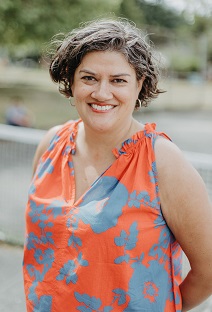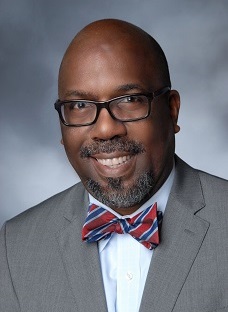
Summer 2021
Adapting Professionally during COVID-19: A Conversation with Dr. India Ornelas and Dr. Reginald Tucker-Seeley
Rachel Shelton, ScD✉; SBM Member Delegate


India Ornelas, PhD, MPH and Reginald Tucker-Seeley, ScD
Thanks for joining! Let’s talk about some adaptations that would be useful to keep in light of everything that has happened in the past year. What do you think is important for organizations like SBM to continue prioritizing.
Dr. Ornelas: We need to figure out how to talk about racism and its impact on health. SBM has the opportunity to reflect on what our role is as a professional organization in keeping this issue front and center, and how can we continue to diversify the workforce. I think professional organizations have a huge role play to play in that. We also need to think about how to make it so it is part of the whole organization and not only within a SIG.
Dr. Tucker-Seeley: I think that's a good point, Dr. Ornelas. Professional organizations attempting to confront systemic racism have to make sure that such efforts are not siloed within their organizations; that is, they have to make sure that such efforts to be “anti-racist” are woven throughout the entire organization. Given the sustained conversation we've been having in our field about systemic racism and how organizations can be more anti-racist, we have an opportunity to ensure real change as we come out of the pandemic. We can’t just come out of our homes and go back to ‘normal’ and return to what life was like. Pre-pandemic we were definitely not discussing issues related to systemic racism and the impact that structural racism has had on our workforces and health outcomes.
Editor’s Note: Earlier this year, SBM unveiled a new strategic plan that foregrounds diversity, equity, and inclusion and expressly diffuses them throughout the organization as a whole. Rather than having DEI as one standalone outcome, SBM’s Board incorporated DEI into each strategic outcome identified in the plan, to ensure it is a priority at every level of the organization.
Dr. Ornelas: Also, I think the past year really highlighted the importance of our science being used. Something that I think SBM has always tried to focus on is how do we get our science into the right hands, such as policymakers, and the clinical and public health practice community.
Dr. Tucker-Seeley: Oh, that is critical! I think figuring out how we can better ensure that the people who need the science get it. During the pandemic, I was so frustrated by people with a lack of expertise communicating about issues related to health disparities in the popular media. We have to do a much better job of not only communicating our science in peer reviewed journals but figuring out the best ways to get our science to the popular press and to policymakers. Unfortunately, many of us don’t have the training to do that well.
Dr. Ornelas: Well, that was a big shift, for me, this year, I started writing Op-eds for the first time. And I actually developed my Twitter and social media profile for the first time. Now, it’s where I am actually finding the most relevant science. I think it humanizes our field to be visible in non-academic spaces, too. We are researchers, but we are also people who care deeply about the issues we work on. Opinion pieces give us an outlet to share that perspective. It’s helpful to find your niche and figure out how to make social media work for you. I’ve been getting to know reporters and the media team within my own institution. The editorials and commentaries I wrote were actually more rewarding than the journal articles I wrote this year.
Dr. Tucker-Seeley: Yes! After we publish papers, we should also ask, “How do we get our work out to the community and how do you translate our work for the community?”. I think the public is a bit more open to talking about health issues after the pandemic, because we've been talking about health for the past year, so I think we should capitalize on this attention to health issues, and figure out how we (public health/behavioral medicine) remain in the public eye.
Thanks for sharing—these are great suggestions. Other ways the past year has changed your work professionally or your research?
Dr. Ornelas: I had to decide whether I was going to be a COVID-19 researcher or not. As someone that does community engaged research, I had to listen to the communities’ priorities. I was in the middle of an intervention trial and I had to pause it, due to COVID-19. Fortunately, I got some internal funding from the University of Washington to do a small COVID-19 grant with my intervention trial participants. The trial was about the mental health of Latina immigrant women, and I realized I wouldn’t be able to understand the findings from the trial without understanding the impact of COVID-19 on the participants’ lives.
We also had to adapt our intervention modality to Zoom. It has been delivered in-person, so now we're going to have results on how the intervention performed in two different modalities – an unintended hybrid trial. It's been so interesting because our participation rates have actually been higher on zoom than they were in person, more women are showing up.
Dr. Tucker-Seeley: I found myself during this period, asking more COVID-19 policy related questions. I did get some funding from USC and am currently conducting a COVID-19 policy scan project. We are exploring specific legislation and executive orders at the federal level and across three states related to COVID-19. And, what we're looking for is explicit language that lists or mentions our vulnerable populations of interest. Specifically, we are looking for ways in which legislation was used to address the disproportionate impact of COVID-19 on vulnerable groups. We know that to address disparities, a one-size fits all policy approach is not going to work. I’m very excited about this work and eager to see where it goes.
That sounds amazing, thanks for sharing that. Any final thoughts on changes you are making with respect to students or your research team?
Dr. Ornelas: We always do check-ins at the beginning of our research team meetings to see how we were all doing personally. During COVID-19, I felt like that was so critical and I want to keep doing that. Everyone has been under so much stress this year, it was important for me as the leader of a research team that is mostly women of color, to be understanding and gracious. We need to continue that, and realize that people will continue to have challenges navigating work and life balance as we transition out of the pandemic.
Dr. Tucker-Seeley: I tried to give students in my lab the space to discuss how they were doing during this time as well, but we also tried to make sure that we prepared them for post-pandemic life. I trained in business (accounting) as an undergrad and that training included a lot of professional development opportunities. So, I’ve started to incorporate professional development once a month in my lab meetings. We added discussion about how you network, how you build your mentor team, and how you prepare a resume during this year in our lab meetings.